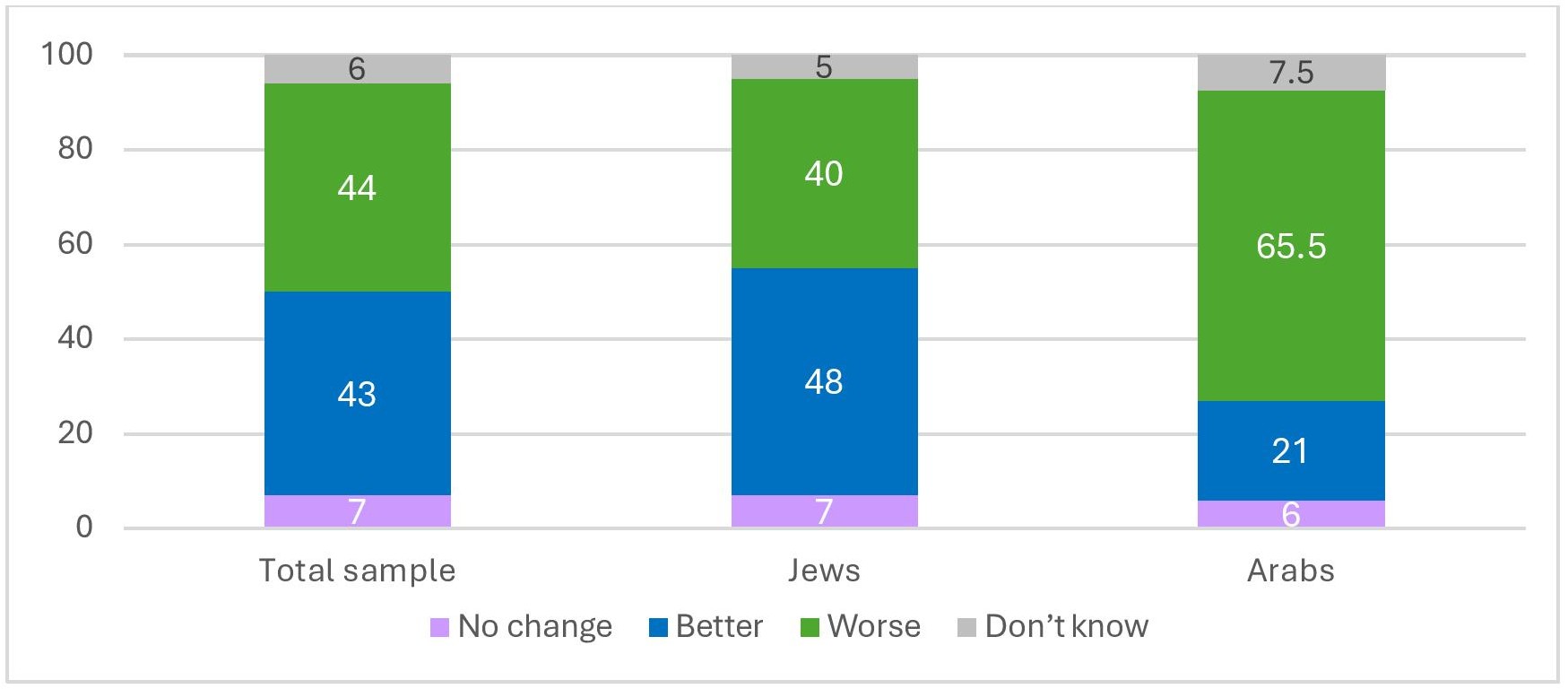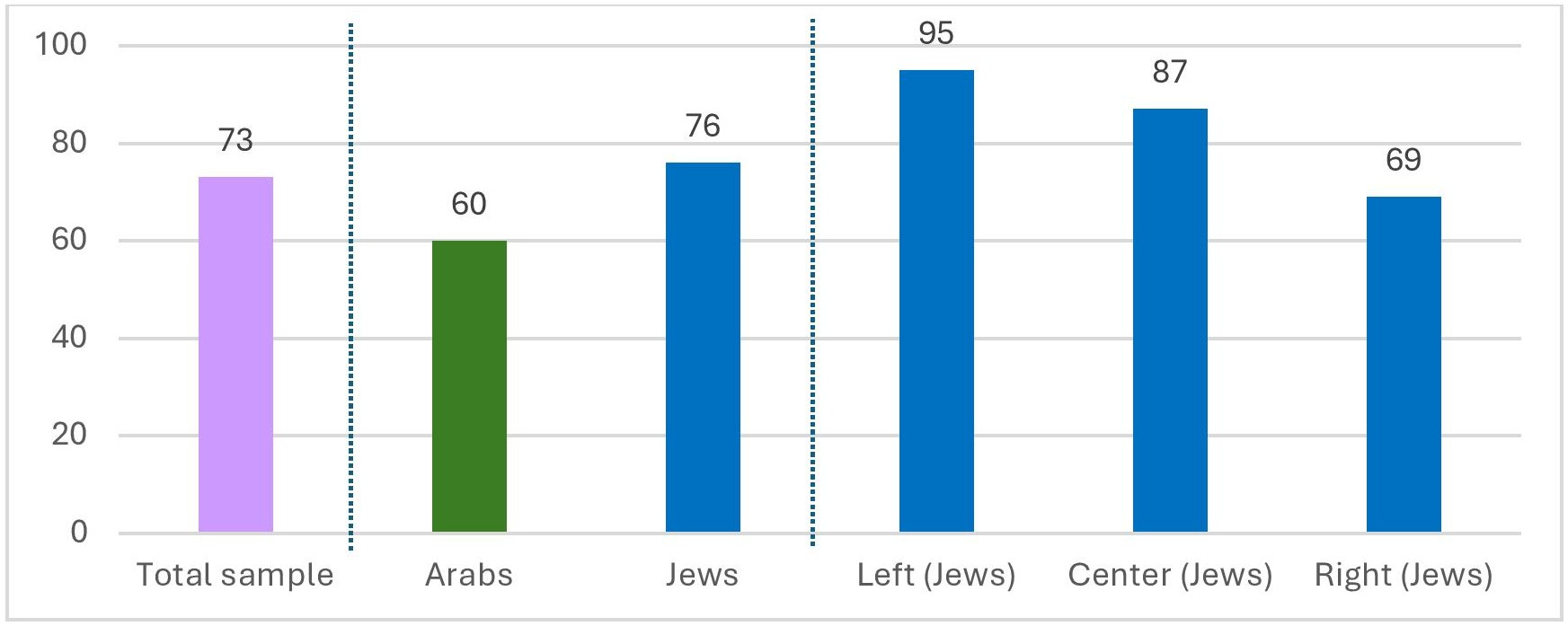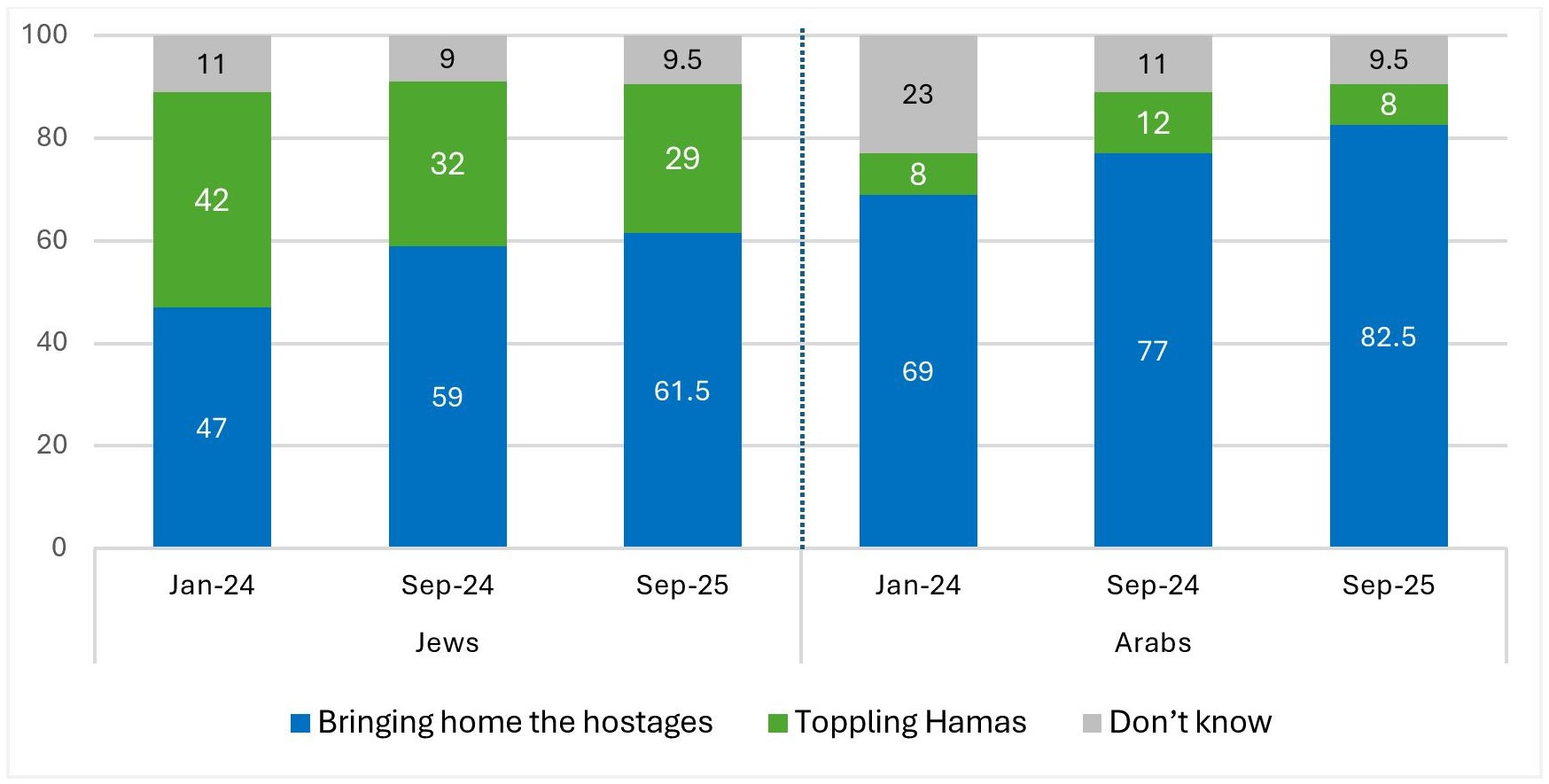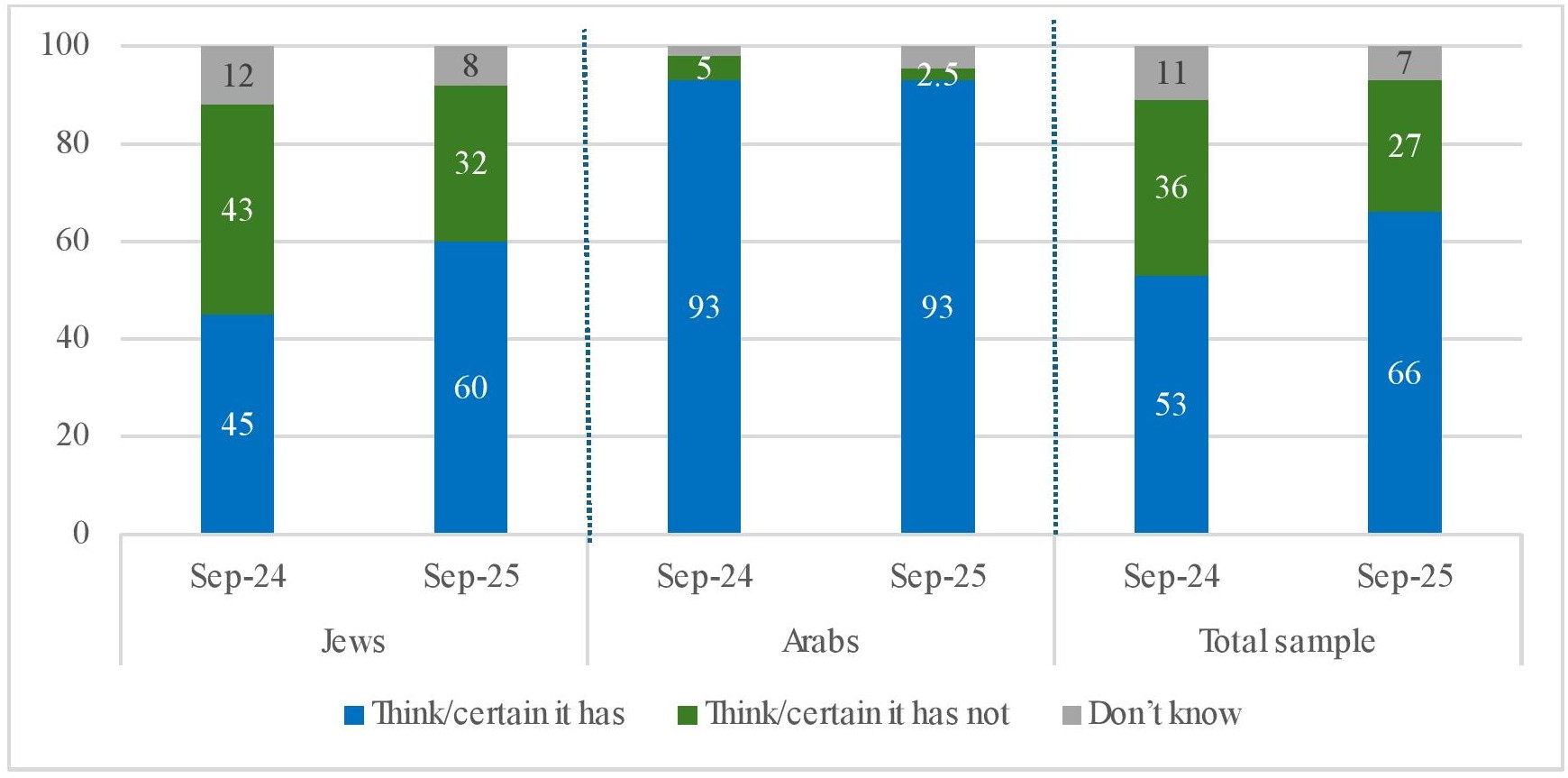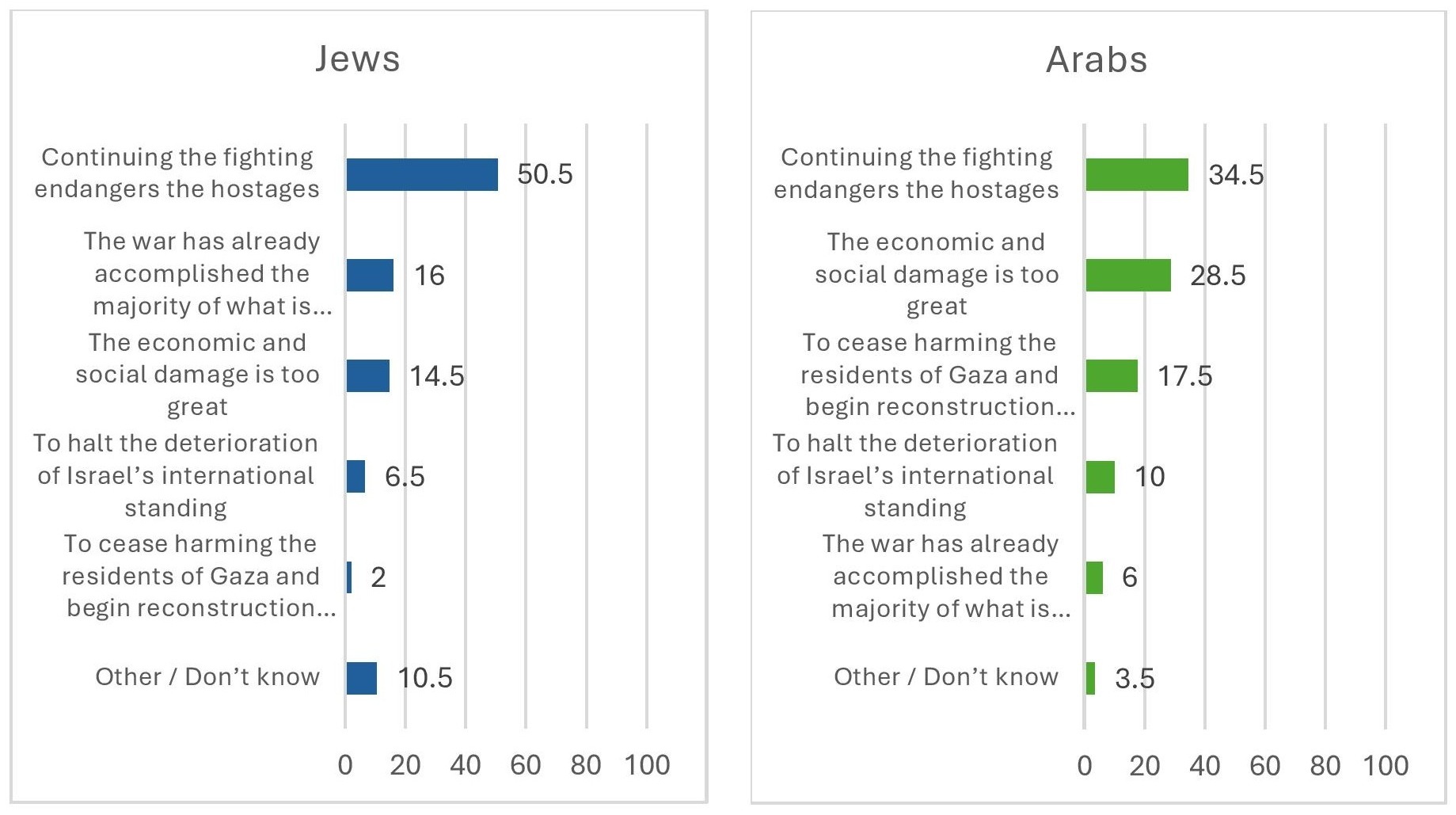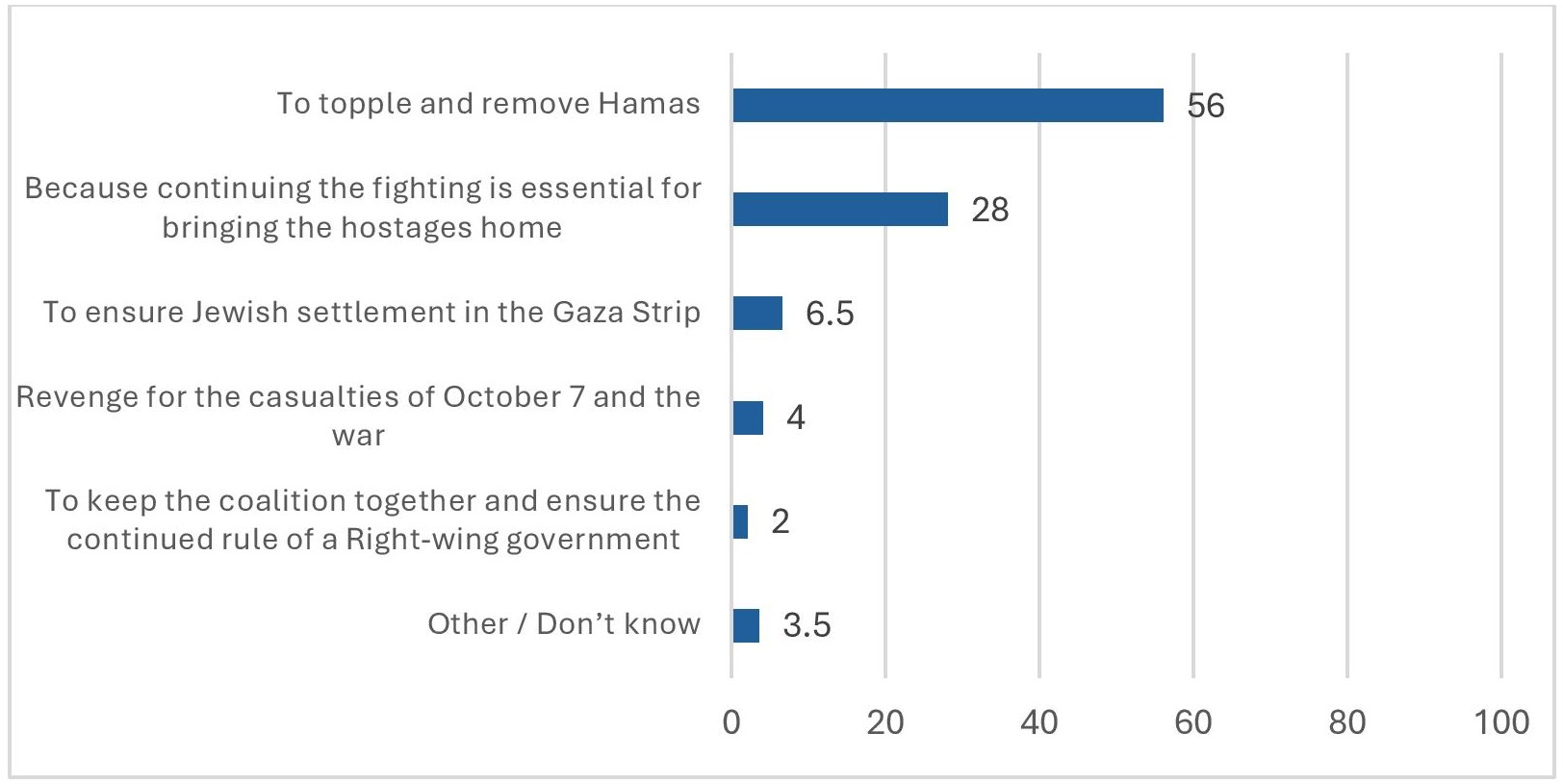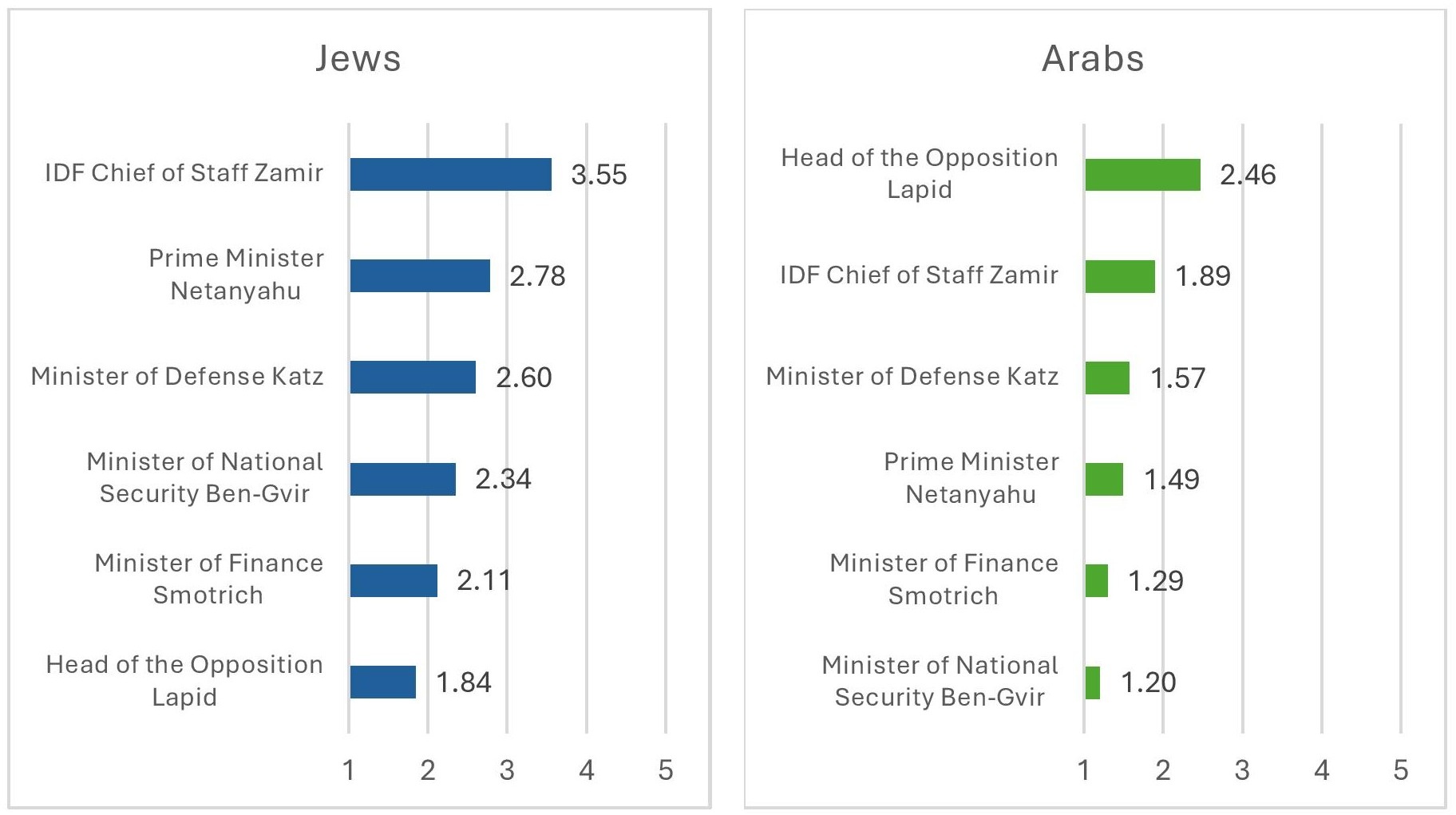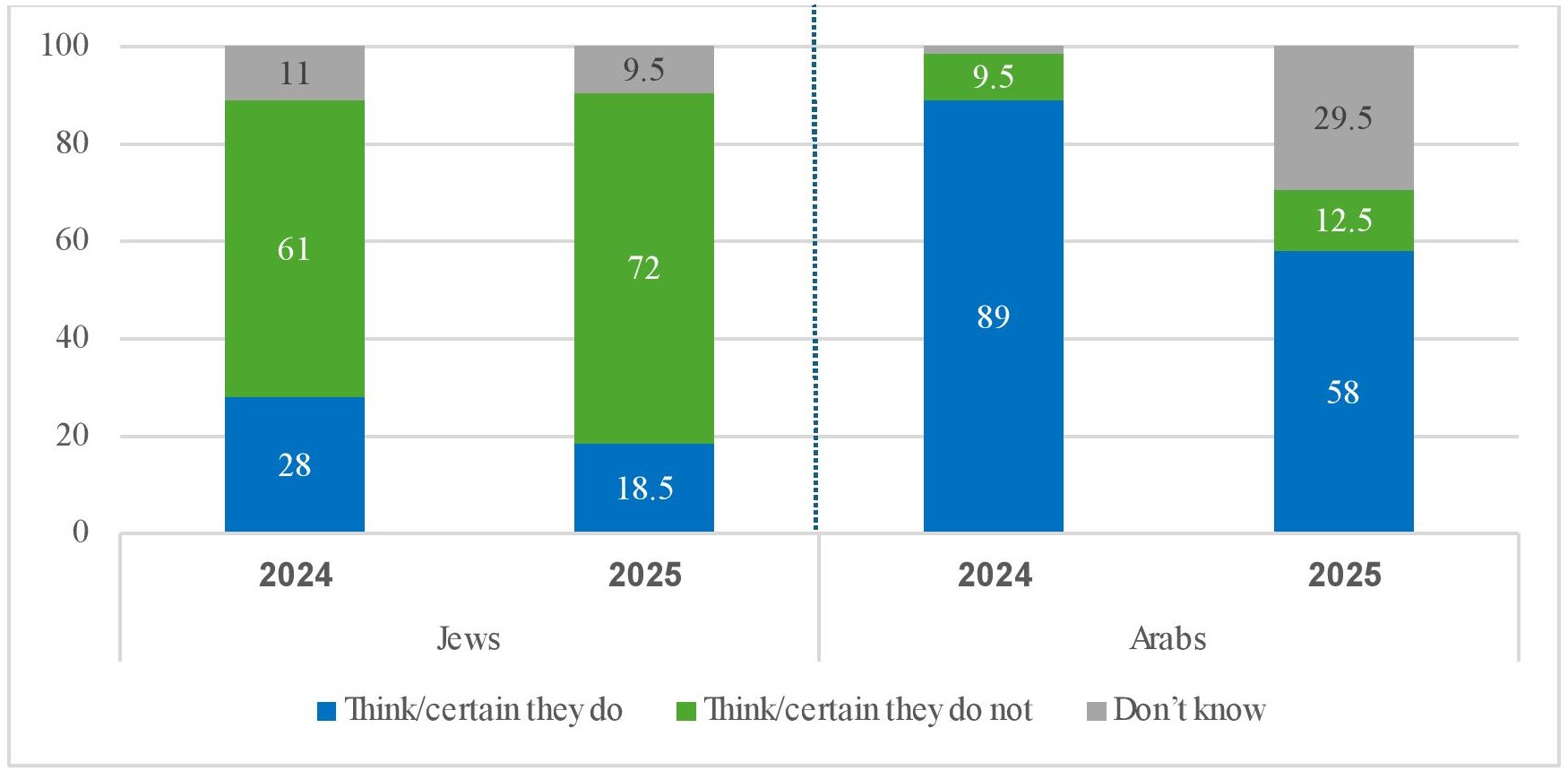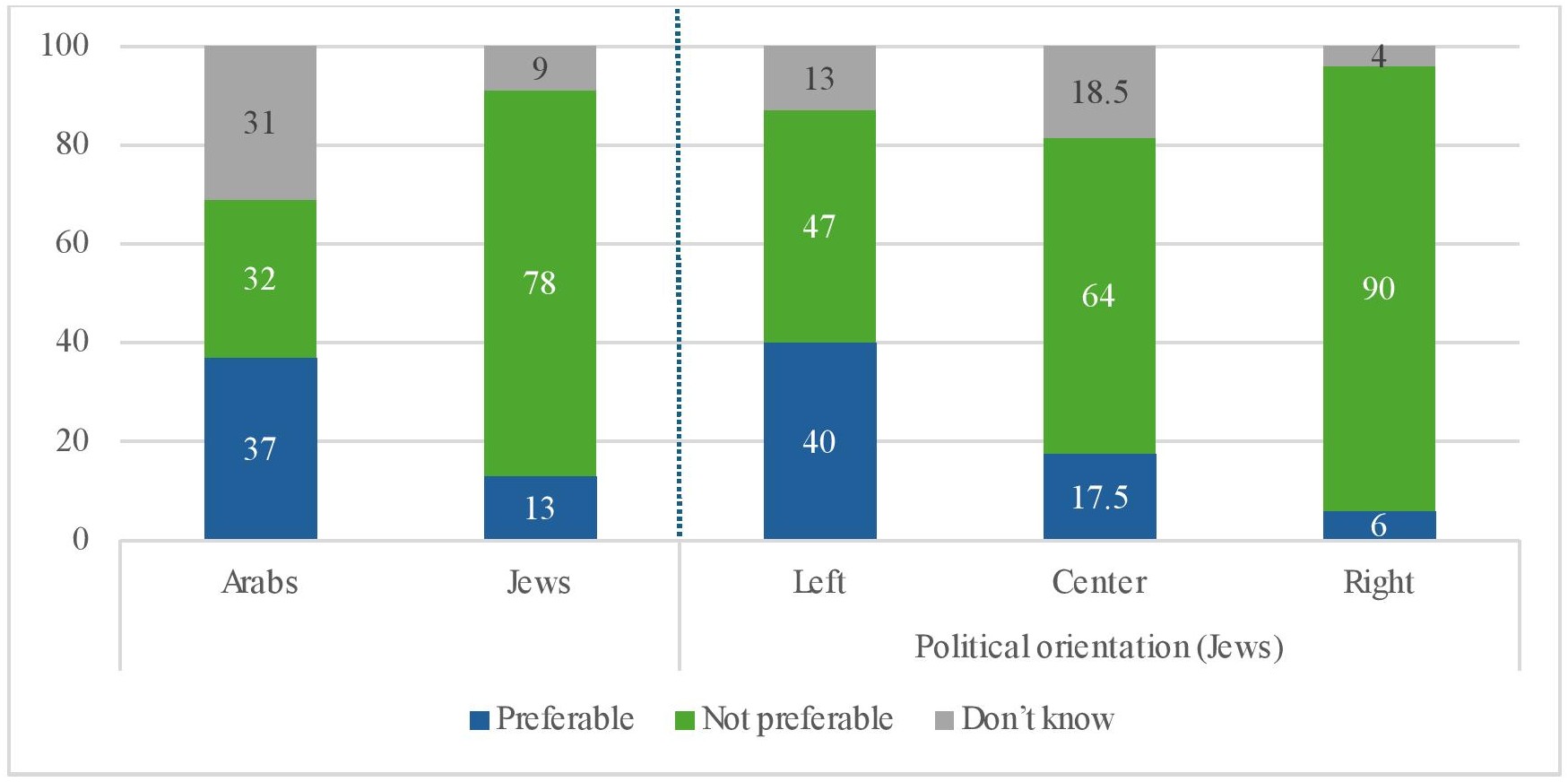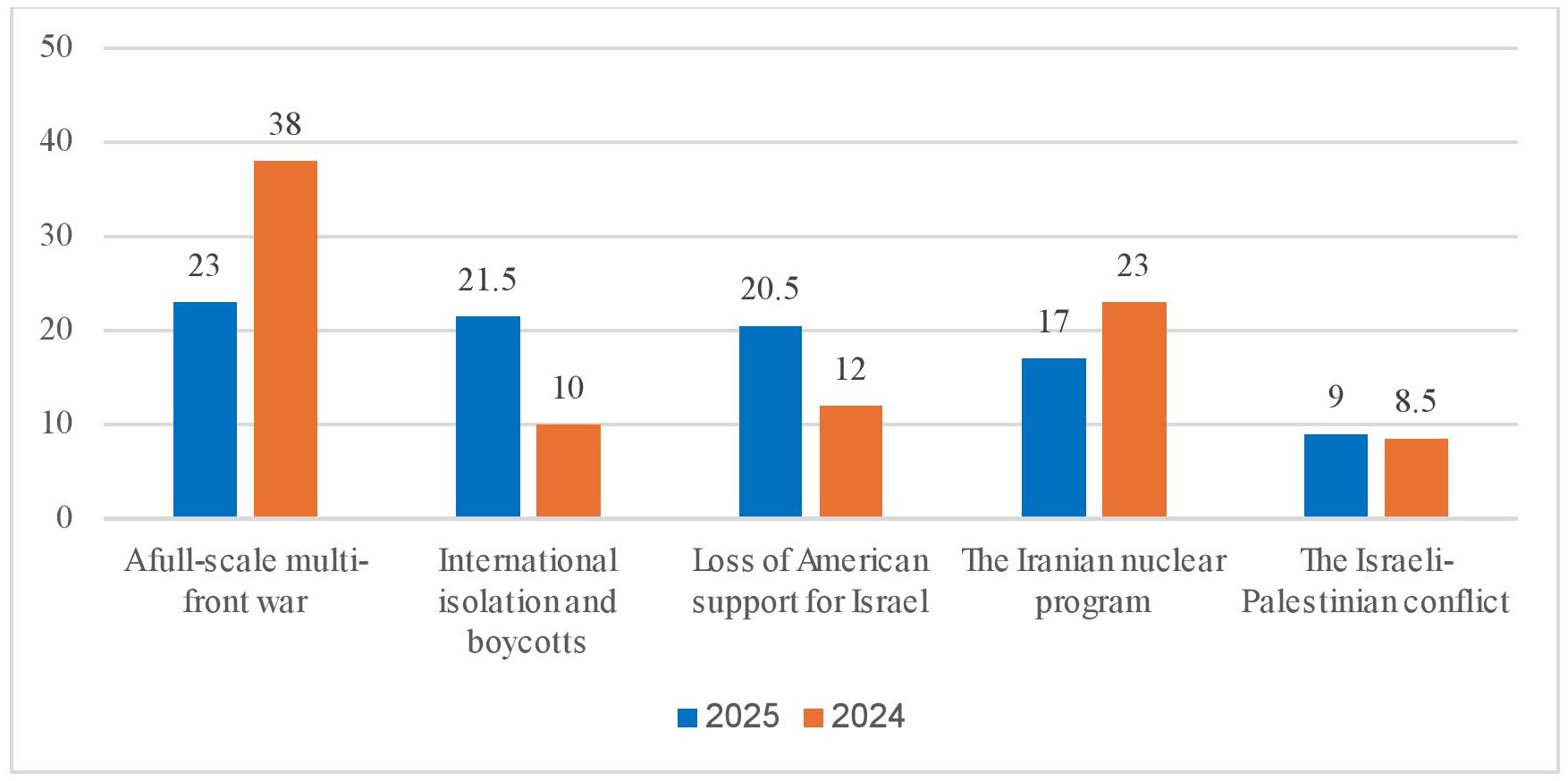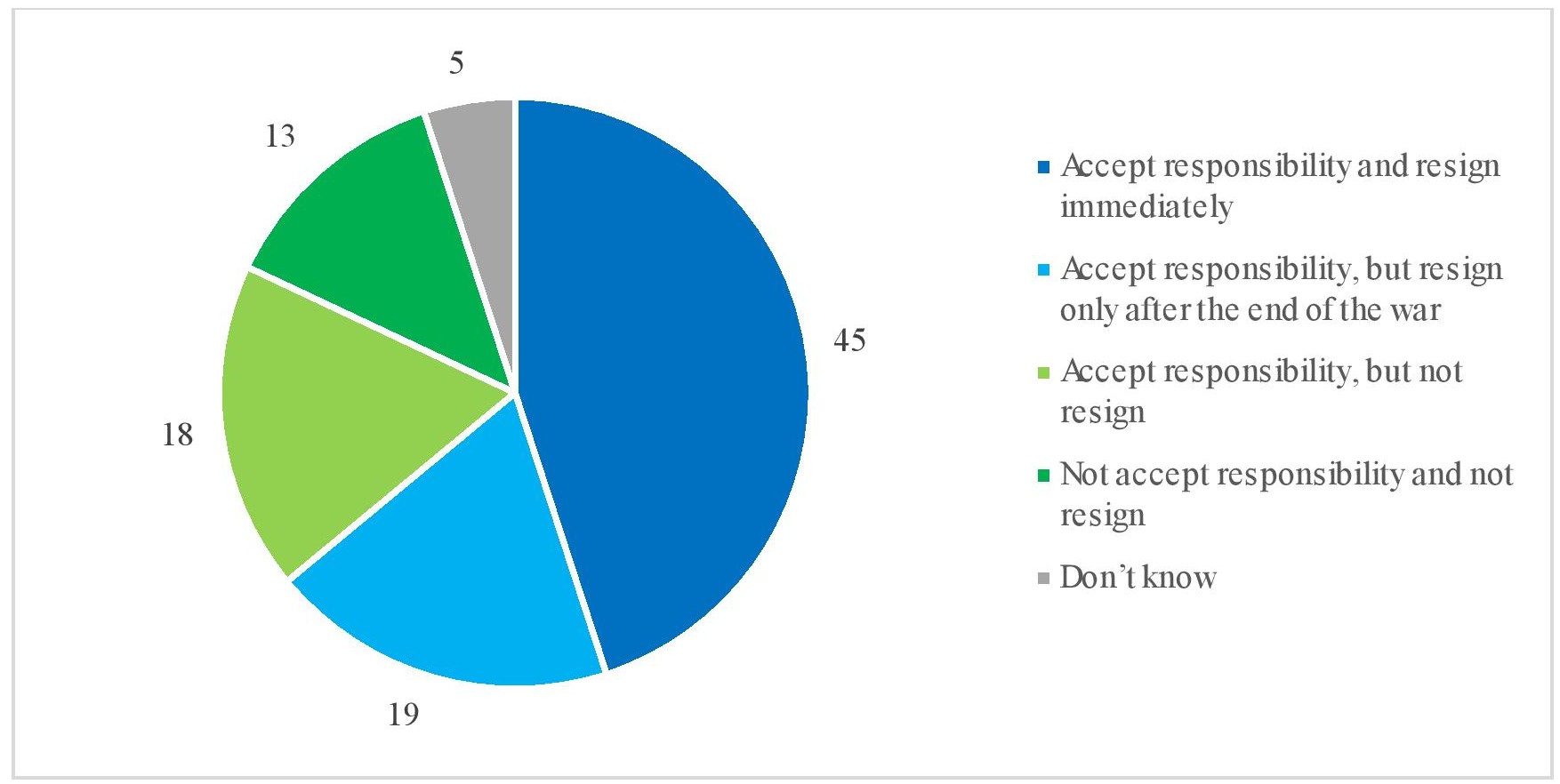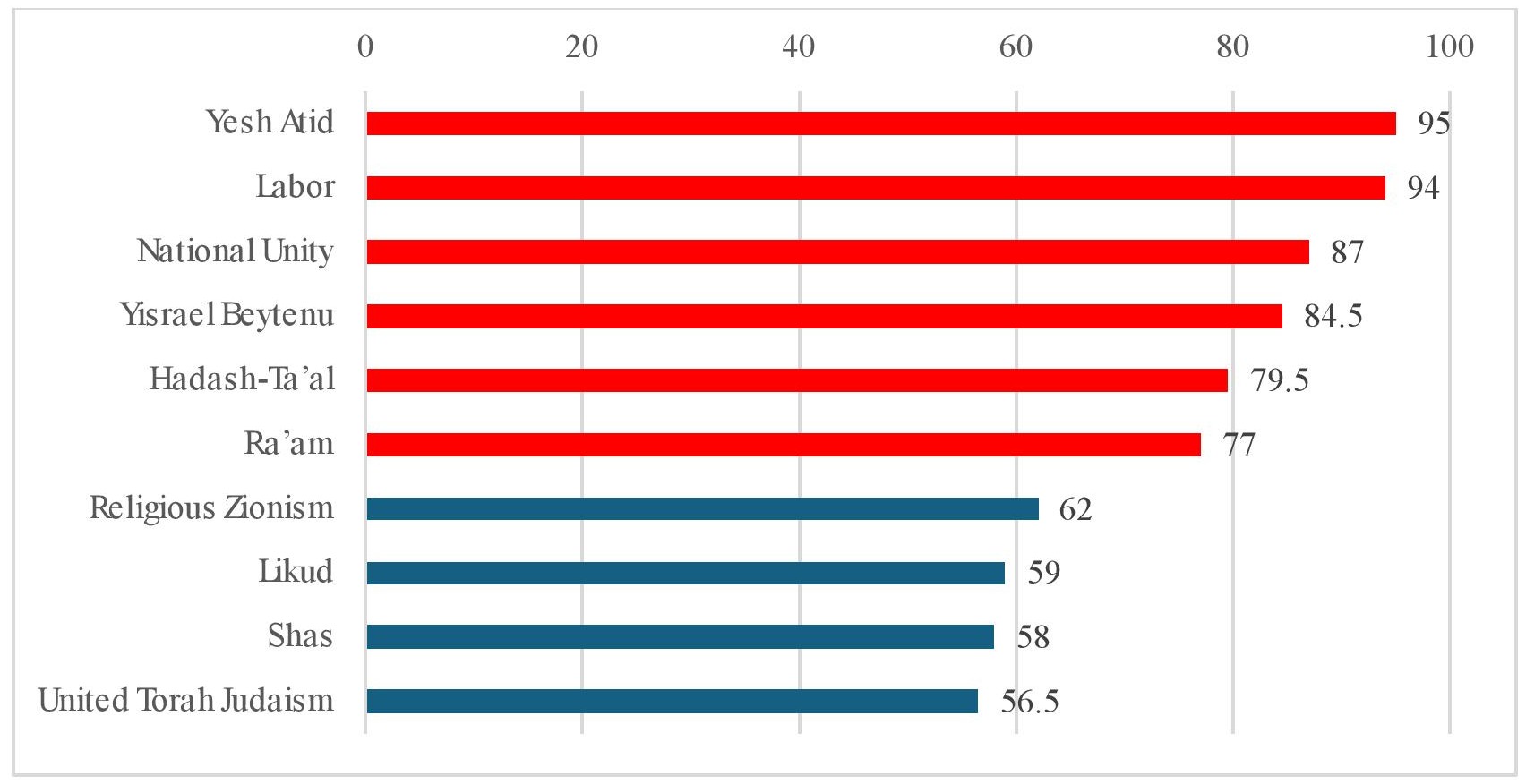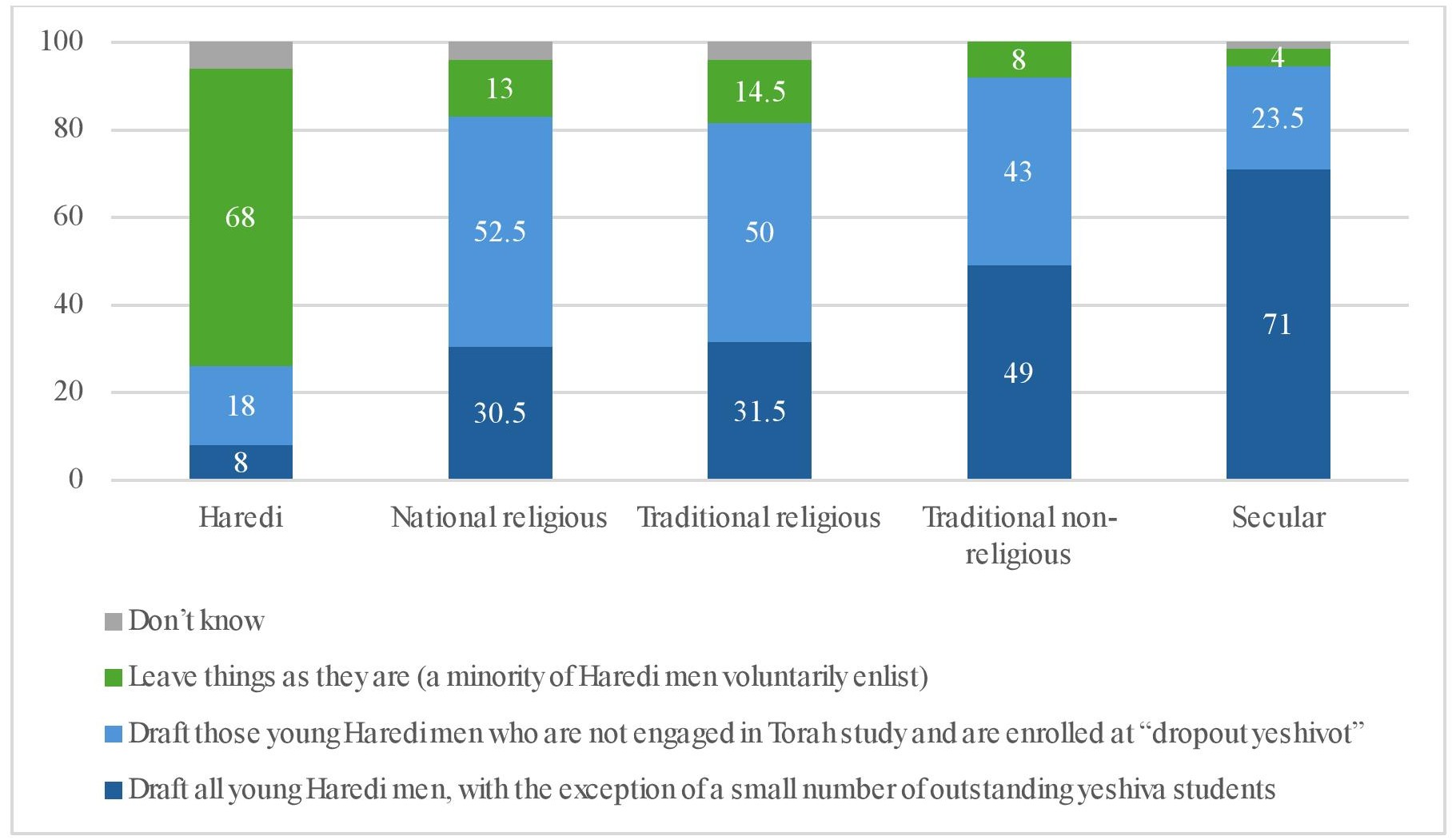A special survey released as Israel prepares to mark two years since the start of the war on October 7, 2023 finds: 66% of Israelis say the time has come to end the war in Gaza – up 13 percentage points since this time last year. The top reason Israelis say the war should end is the endangerment of the hostages, among both Jews (50.5%) and Arabs (34.5%). 64% of Israelis think Netanyahu should take responsibility for Oct. 7 and resign, either now (45%) or after the war (19%).

Photo by Chaim Goldberg/FLASH90
Methodology
The survey was carried out by the Viterbi Family Center for Public Opinion and Policy Research at the Israel Democracy Institute. It was conducted via the internet and by telephone (to include groups that are under-represented on the internet) between September 14–18, 2025, with 800 male and female participants interviewed in Hebrew and 200 in Arabic, constituting a representative sample of the population in Israel aged 18 and above. The maximum sampling error was ±3.10% at a confidence level of 95%. Field work was carried out by Shiluv I2R.
The Security Situation in Israel Compared to Before October 7
The public is evenly divided regarding Israel’s security situation today compared to before October 7: 43% think that the current situation is better, while 44% think it is worse than two years ago. Only 7% think it has not changed.
A slightly larger share of Jews consider the security situation to be better now (48%) than think it is worse (40%). By contrast, a considerably larger share of Arabs think the situation is worse now (65.5%) than think it is better (21%).
On the Left and in the Center (Jews), the majority think that Israel’s security situation today is worse (68% and 52%, respectively), while on the Right, the majority think it is better (57%).
How would you describe the security situation of the State of Israel compared to before the events of October 7? (%)
Israel’s International Standing Compared to Before October 7The survey was conducted before the various announcements recognizing the Palestinian state by European countries and at the United Nations.
The majority of the public think that Israel’s standing in the international arena is worse today than it was before October 7 (total sample, 73%; Jews, 76%; Arabs, 60%).
This is also the view of the majority in each of the three political camps (Jews), though these majorities are of different sizes: 95% of those on the Left, 87% in the Center, and 69% on the Right think that Israel’s international standing has declined.
Think that Israel’s international standing today is worse than it was before the events of October 7 (%)
The Goals of the War
The main goal of the war in Gaza today should be the bringing the hostages home, according to 65% of the total sample. The share of those who hold this view has risen steadily since January 2024, among both Jews and Arabs. In all surveys to date, a larger proportion of Arabs than of Jews think this should be the main goal.
Concomitantly, the share of those who cite toppling Hamas as the main goal has fallen in both publics, though this view is held by a notably larger proportion of Jews than of Arabs.
While on the Left and in the Center (Jews) a huge majority think that returning the hostages should be the main goal (94% and 80%, respectively), this view is held by less than half of those on the Right (48%, compared to 41% who think that toppling Hamas should be the main goal).
In your opinion, which of the two declared war goals, toppling Hamas or bringing home the hostages, should be Israel’s main goal today? (%)
Has the Time Come to End the War in Gaza, and Why or Why Not?
The majority of the Israeli public thinks that the time has come to end the war in Gaza (66% of the total sample). Though a majority of both Arabs and Jews agree on this point, this majority is much larger among Arabs (93%) than among Jews (60%).
While there was already a consensus among Arabs in last year’s survey that the war should be ended, among Jews there has been a reversal in opinion—last year less than half thought the war should be ended, while today there is a solid majority who think the time has come.
Has the time come to end the war in Gaza? (%)
The differences between political camps (Jews) are very large: On the Left, an overwhelming majority (94.5%) think the war should be ended, as do a large majority of those in the Center (75%), but on the Right only close to half (48.5%) agree with this position, while 42% think the time has not come, and the rest say they don’t know.
About half of the Jews who said that the war should be ended gave the reason that continuing the fighting endangers the hostages, while among Arabs who think the war should be stopped, only about a third gave this as the main reason.
Surprisingly, the reason of ending harm to the residents of Gaza and beginning reconstruction of the Gaza Strip ranked only in third place among Arab respondents, below the protecting the hostages and the economic and social damage caused by the war. Among the Jews, only 2% saw ceasing harm to the residents of Gaza as a reason to stop the war.
Main reason why the war in Gaza should be ended (% of respondents who think the time has come to end the war)
In all three political camps (Jews), the danger to the hostages is the main argument used by those who support a cessation of hostilities in Gaza (Left, 54%; Center, 58%; Right, 45%).
Among the respondents who think that the war should not be stopped now, the majority (56%) cite the purpose of toppling and removing of Hamas. In second place is the argument that only by continuing the fighting will it be possible to secure the release of the hostages (28%).
Main reason why the war in Gaza should not be ended (total sample; % of respondents who think the time has not come to end the war)
Ratings of Senior Officials’ Performance in Conducting the War
All the officials we asked about, both in the government and outside of it, received performance ratings lower than the mid-point score (3), with the exception of the IDF chief of staff, who received a slightly higher average score (3.26 in the total sample, 3.55 among Jews, but only 1.89 among Arabs).
It should be noted that last year as well, all the officials examined (including then-Chief of Staff Herzi Halevi) received an average score lower than the mid-point.
Prime Minister Netanyahu’s average score this year among Jews (2.78) is higher than last year’s (2.33). Among Arabs, the prime minister’s score increased only slightly, from 1.38 to 1.49.
Once again this year, the performance ratings of all the officials are lower among Arabs than among Jews. The only exception is the head of the opposition, Yair Lapid, who was rated more highly by Arabs (2.46) than by Jews (1.84).
Head of the Opposition Lapid received the lowest score of all the officials in the Jewish sample this year (1.84, down from 2.00 last year).
National Security Minister Ben-Gvir received the lowest score among Arabs once again this year (1.20, the same as last year). Among Jews, his average score rose from 2.05 to 2.34.
Finance Minister Smotrich, who was not mentioned in this question last year, received the second lowest score among both Jews (2.11) and Arabs (1.29).
Defense Minister Katz, who was also not included last year, received the third highest score among Jews (2.60), behind IDF Chief of Staff Zamir and Prime Minister Netanyahu. He was also ranked third in the Arab sample, but with a much lower score (1.57).
Average scores given to selected officials for their performance in conducting the war (on a scale from 1=very poor to 5=excellent)
The discrepancies in ratings awarded by the different political camps (Jews) are very large. IDF Chief of Staff Zamir is the only official given a similarly high assessment in all camps (though his score on the Left is slightly lower than in the Center and Right). The rest of the officials are more controversial, and there are large discrepancies between the scores given to them by the three political camps.
On the Right, Prime Minister Netanyahu has a rating quite close to that of IDF Chief of Staff Zamir, and his score has in fact risen significantly compared to last year. Netanyahu’s score also rose in the Center. On the Left, on the other hand, his score dropped slightly compared to last year.
The ratings for Head of the Opposition Lapid have declined significantly on the Left and in the Center compared to last year.
National Security Minister Ben-Gvir’s score remained fairly steady on the Left, but rose in the Center and on the Right.
As noted, Defense Minister Katz was not listed in this question last year. As expected, his score on the Left is lower than in the Center and on the Right.
Finance Minister Smotrich received very low scores on the Left and in the Center, and a higher score on the Right.
Average scores given to selected officials for their performance in conducting the war (Jews, by political orientation; on a scale from 1=very poor to 5=excellent; 2024 score given in parentheses, where relevant)
Left
Center
Right
IDF Chief of Staff Zamir
3.46
3.63
3.53
Prime Minister Netanyahu
1.26 (1.30)
1.89 (1.60)
3.42 (2.94)
Head of the Opposition Lapid
2.47 (2.98)
2.22 (2.56)
1.58 (1.50)
Minister of National Security Ben-Gvir
1.14 (1.12)
1.60 (1.39)
2.87 (2.60)
Minister of Defense Katz
1.22
1.93
3.13
Minister of Finance Smotrich
1.11
1.56
2.53
A Palestinian State
Almost three-quarters of the Jewish public think that the Palestinian people do not have the right to a state of their own, an increase of 11 percentage points from last year.
Among Arab respondents, there was an unusually sharp fall in the share of those who think that the Palestinian people have the right to a state, along with an increase in the percentage of respondents who selected the “don’t know” response. An additional measurement is needed to confirm this finding, and if it turns out to be correct, then the reasons for this decline should be examined in depth. It is possible that the unusual degree of uncertainty expressed in the Arab sample indicates fear of expressing a position on this sensitive issue.
In all three political camps (Jews), there has been a decline in the share of those who think that the Palestinian people have the right to their own state. Only on the Left is there a (small) majority who support this right: 57% of those on the Left say that the Palestinian people have the right to a state of their own (73% last year), as do 24% of those in the Center (39% last year), and only 8% on the Right (12% last year).
In your opinion, do the Palestinian people have or not have the right to their own state? (%)
We asked our respondents: “In terms of Israel’s national interest, is it preferable or not preferable for an independent Palestinian state to be established at the current time? Among Jews, a large majority (78%) think that this is not something that Israel can afford at the moment.
In the Arab sample, the share of those who think Israel can accommodate the establishment of a Palestinian state is only slightly larger than the share who hold the opposite view (37% and 32%, respectively). As in the previous question, the proportion of “don’t know” responses is very high (31%).
In all three political camps (Jews), including the Left, the share of those who think that in terms of Israel’s national interests it is undesirable for a Palestinian state to be established is larger than the share of those who think the opposite. On the Right and in the Center, this is the view of a substantial majority (90% and 64%, respectively).
In terms of Israel’s national interests, is it preferable or not preferable for a Palestinian state to be established at the current time? (%)
We cross-tabulated responses in the total sample to the two questions regarding a Palestinian state, and found that even among those who think that the Palestinian people have the right to a state of their own, only 54% think that in terms of Israel’s national interests, it is preferable for a Palestinian state to be established at the current time. Among those who do not think that the Palestinian people have the right to a state, 93.5% think that establishing a Palestinian state would be contrary to Israel’s national interests.
External Threats to the State of Israel
A full-scale multi-front war is perceived by 23% of the general public (Jews, 22%; Arabs, 29%) as the most serious external threat to Israel, but there has been a significant decrease in this share compared to last year.
As expected, compared to last year, there has also been a decline in the perceived threat of the Iranian nuclear program (Jews, 19%; Arabs, 7%).
International isolation and boycotts and losing American support are perceived as the most serious threats by about one-fifth of the public, and in both cases there was also an increase compared to last year (Jews—international isolation/boycotts, 22%; loss of American support, 19%; Arabs—international isolation/boycotts, 19%; loss of American support, 30%).
The Israeli-Palestinian conflict is considered the greatest external threat by Jews and Arabs to an equally small degree, with only about one-tenth citing it as the main threat.
What is the greatest external existential threat to the State of Israel? (total sample, 2024 and 2025; %)
Breaking down the Jewish sample by political orientation reveals that on the Left, the threats perceived as the most dangerous are international isolation and boycotts (43%) and the loss of American support (23%). The same is true of the Center, though to a lesser degree (international isolation and boycotts, 29%; loss of American support, 20%). On the Right, the threats perceived as the gravest are a full-scale multi-front war (25%) and the Iranian nuclear program (23%).
Should Netanyahu Take Responsibility for the Events of October 7 and Resign?
Almost half of the Israeli public believe that Netanyahu should take responsibility and resign immediately. Close to 20% think he should accept responsibility but resign only at the end of the war, and a similar proportion think he should accept responsibility but not resign. Only a small minority think that Netanyahu should not take responsibility and should not resign. This distribution of responses is very similar to the one we found in February 2025.
Until now, Prime Minister Netanyahu has not accepted any responsibility for the events of October 7, and has not resigned. What do you think the prime minister should do? (total sample; %)
The share of those who think that Netanyahu should accept responsibility and resign immediately is much higher among Arabs (67%) than among Jews (41%).
In the Center, and even more so on the Left (Jews), a large majority think that Netanyahu should take responsibility and resign immediately (63% and 88% respectively). The Right is fairly evenly divided between those who think he should step down (accept responsibility and resign immediately, 23%; accept responsibility but resign only after the end of the war, 25%) and those who think he should remain in office (accept responsibility but not resign, 27%; not accept responsibility and not resign, 21.5%).
Among those who think that Netanyahu should accept responsibility and resign immediately, the average score given to Netanyahu for his performance in the war is very low (total sample, 1.32). His average performance score among those who think he should take responsibility but resign only after the war is more than twice as high, but is still below the mid-point, at 2.86. Among those who think that he should take responsibility but not resign, his performance score is 4.07, and among those who think he should neither accept responsibility nor resign, it is 4.45. In other words, among those who do not think that Netanyahu should resign, his performance rating for the war is well above average.
Establishing a State Commission of Enquiry to Investigate the Events of October 7
A large majority of the public (74%) support establishing a state commission of inquiry to investigate the events of October 7 (Jews, 75.5%; Arabs, 68%).
In the Jewish public, support for the establishment of a state commission of inquiry is particularly strong on the Left (97%) and in the Center (85.5%), but even among those on the Right (68%), there is a majority who favor such a step.
A particularly interesting finding is that even among those who voted for coalition parties in the 2022 elections, a clear majority of voters for each party support the establishment of a state commission of inquiry to investigate the events of October 7.
Support establishing a state commission of inquiry to investigate the events of October 7 (total sample; %)
Haredi Conscription
In the total sample, 47% (49% of Jews) support conscription of all young Haredi men, with the exception of a small number of outstanding yeshiva students; 30.5% (34% of Jews) support conscription of young Haredim who are not engaged in Torah study and are enrolled at “dropout yeshivot”; and 17% (15% of Jews) support maintaining the current situation, whereby a minority of Haredi men voluntarily enlist.
Breaking down the Jewish sample by religiosity reveals that only the Haredim support leaving things as they are. A large majority of secular Jews, as well as about half of the traditional non-religious public, support the conscription of all young Haredi men, with the exception of a small number of outstanding yeshiva students. About half of the national religious and traditional religious publics support the conscription of young Haredim attending “dropout yeshivot,” and another third support the conscription of all young Haredi men.
Despite the high level of support in the Haredi public for maintaining the current situation, about a quarter of Haredi respondents support the conscription of Haredim attending “dropout yeshivot” and/or the conscription of all young Haredi men.
Given the fact that, due to the war, the IDF is in need of a very large number of soldiers, what is the correct solution regarding the conscription of Haredim? (Jews; %)
Among voters for the coalition parties in the last elections, drafting young Haredi students from “dropout yeshivot” is the preferred solution for 54% of Likud voters and 49% of Religious Zionism voters. In second place for voters for both parties is the conscription of all young Haredi men (Likud, 28%; Religious Zionism, 32%), and only a minority support the continuation of the current situation (Likud, 15%; Religious Zionism, 17%). Among Shas voters, around half think that things should be left as they are (48%), but around a third (35.5%) support drafting young Haredim who attend “dropout yeshivot.” Only among United Torah Judaism voters is there a majority in favor of maintaining the status quo (81%).
We examined the relation between support for continuing the war and attitudes regarding Haredi conscription (in the total sample). Paradoxically, among respondents who do not think that the war should be ended, there is less support for large-scale conscription of young Haredi men: Only 28% think that all Haredim should be drafted, 43% support the conscription of students at “dropout yeshivot,” and 25.5% support leaving things as they are. Among those who support ending the war, we found a majority in favor of drafting all young Haredi men (55%), while 25% support drafting those attending “dropout yeshivot,” and just 13.5% think that the current situation should be maintained.

